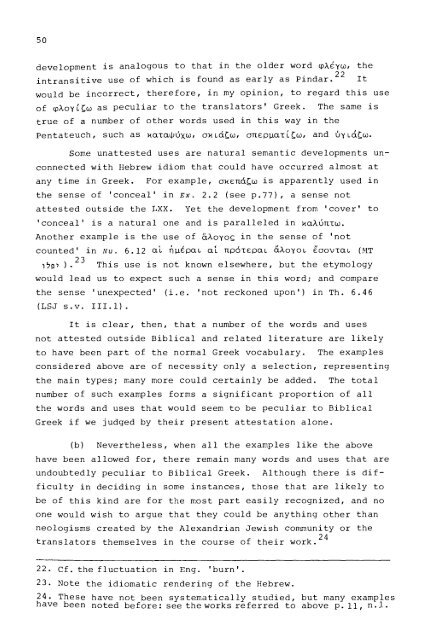A Lexical Study of the Septuagint Version of the Pentateuch
A Lexical Study of the Septuagint Version of the Pentateuch
A Lexical Study of the Septuagint Version of the Pentateuch
Create successful ePaper yourself
Turn your PDF publications into a flip-book with our unique Google optimized e-Paper software.
development is analogous to that in <strong>the</strong> older word φλέγω» <strong>the</strong><br />
22<br />
intransitive use <strong>of</strong> which is found as early as Pindar. It<br />
would be incorrect, <strong>the</strong>refore, in my opinion, to regard this use<br />
<strong>of</strong> φλογίζω as peculiar to <strong>the</strong> translators' Greek. The same is<br />
true <strong>of</strong> a number <strong>of</strong> o<strong>the</strong>r words used in this way in <strong>the</strong><br />
<strong>Pentateuch</strong>, such as καταψύχω, σκιάζω, σπερματίζω, and ύγιάζω.<br />
Some unattested uses are natural semantic developments un<br />
connected with Hebrew idiom that could have occurred almost at<br />
any time in Greek. For example, σκεπάζω is apparently used in<br />
<strong>the</strong> sense <strong>of</strong> 'conceal' in Ex. 2.2 (see p.77), a sense not<br />
attested outside <strong>the</strong> LXX. Yet <strong>the</strong> development from 'cover' to<br />
'conceal' is a natural one and is paralleled in καλύπτω.<br />
Ano<strong>the</strong>r example is <strong>the</strong> use <strong>of</strong> άλογος in <strong>the</strong> sense <strong>of</strong> 'not<br />
counted' in Nu. 6.12 αί ήμέραι α'ι πρότεραι άλογοι έσονται (MT<br />
2 3<br />
). This use is not known elsewhere, but <strong>the</strong> etymology<br />
would lead us to expect such a sense in this word; and compare<br />
<strong>the</strong> sense 'unexpected' (i.e. 'not reckoned upon') in Th. 6.46<br />
(LSJ s.v. III.l).<br />
It is clear, <strong>the</strong>n, that a number <strong>of</strong> <strong>the</strong> words and uses<br />
not attested outside Biblical and related literature are likely<br />
to have been part <strong>of</strong> <strong>the</strong> normal Greek vocabulary. The examples<br />
considered above are <strong>of</strong> necessity only a selection, representing<br />
<strong>the</strong> main types; many more could certainly be added. The total<br />
number <strong>of</strong> such examples forms a significant proportion <strong>of</strong> all<br />
<strong>the</strong> words and uses that would seem to be peculiar to Biblical<br />
Greek if we judged by <strong>the</strong>ir present attestation alone.<br />
(b) Never<strong>the</strong>less, when all <strong>the</strong> examples like <strong>the</strong> above<br />
have been allowed for, <strong>the</strong>re remain many words and uses that are<br />
undoubtedly peculiar to Biblical Greek. Although <strong>the</strong>re is dif<br />
ficulty in deciding in some instances, those that are likely to<br />
be <strong>of</strong> this kind are for <strong>the</strong> most part easily recognized, and no<br />
one would wish to argue that <strong>the</strong>y could be anything o<strong>the</strong>r than<br />
neologisms created by <strong>the</strong> Alexandrian Jewish community or <strong>the</strong><br />
24<br />
translators <strong>the</strong>mselves in <strong>the</strong> course <strong>of</strong> <strong>the</strong>ir work.<br />
22. cf. <strong>the</strong> fluctuation in Eng. 'burn'.<br />
23. Note <strong>the</strong> idiomatic rendering <strong>of</strong> <strong>the</strong> Hebrew.<br />
24. These have not been systematically studied, but many examples<br />
have been noted before: see <strong>the</strong> works referred to above p. 11, n.l.

















